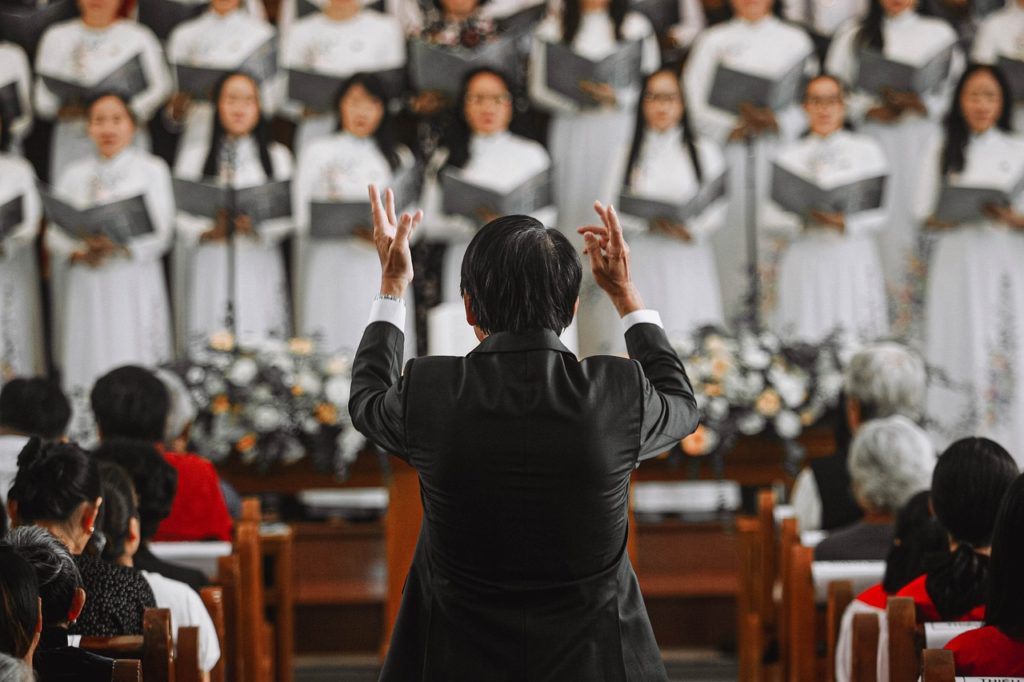Don’t Join Every Singing Group
 Choirs have historically provided opportunities for singers, especially during holiday seasons in the US when, for instance, Handel’s Messiah is regularly performed. Just as Tchaikovsky’s Nutcracker “keeps the lights on” with ballet companies throughout the world, choirs have kept a lot of singers afloat while they wend their way up the career ladder.
Choirs have historically provided opportunities for singers, especially during holiday seasons in the US when, for instance, Handel’s Messiah is regularly performed. Just as Tchaikovsky’s Nutcracker “keeps the lights on” with ballet companies throughout the world, choirs have kept a lot of singers afloat while they wend their way up the career ladder.
Many of our most prized works involve choir singing, from Bach to Handel to Beethoven and beyond. Choirs are a prominent feature of vocal music education and a welcome gift to singers yearning for performance opportunities. But, there are subtle and often hidden hazards to choir singing we need to be aware of. Always look before you leap and consider the following issues before diving into choir singing.
Why We Study Singing
There is a reason people study voice. Of course, it’s to sound better. But the hidden benefit – and a much more important one – is that vocal technique is there to protect the voice. Proper support, phonation, and phrasing prevent “shouting” instead of singing. Whatever your singing goals, studying ideally prevents vocal strain. In the best of circumstances, choirs actually help our study. They are like laboratories for implementing vocal technique and can actually deepen our learning. That’s when things are going well.
Vocal Strain in Youth Choirs: A Closer Look
But, there are hidden dangers in choir singing, particularly for young singers. As a voice teacher, I have again and again run into this problem when teaching. Young singers more often than not are encouraged or required to “bite off more than they can chew” by singing in choirs when they may not be ready. It makes it very hard for me as a voice teacher to protect them from a world already too much encroaching on their young talents. In a nutshell: it’s just too much singing!
Young choir singers, particularly in middle and high school, are often asked to sing for hours at a time long before they have the vocal technique to handle it. Even if the singing is of high quality, what voice teacher has ever asked you to sing a six-hour rehearsal?
A Lack of Regulation
Once they are adults, singers are better equipped to sing long rehearsals and performances. Those who sing in professional choirs often have the protection of a union with some regulation on hours sung, breaks, etc. This is something that is completely unavailable to younger students or even those in college. They often find themselves at sea and unable to fight unreasonable conditions, beginning with the typical two-hour rehearsal. Ask yourself: do people ever take two hour voice lessons?! Is a 15-minute break in the middle really enough (if you’re lucky enough to get it)?
In my experience, the second rehearsal hour never goes as well as the first, because the singers are worn out. And, it continues like that week after week after week. Think of it: if rehearsals are never shorter than two hours, that consistent drag on the voice can really add up to vocal stress.
Parents Bedeviled
Parents are often unaware of the risks of choir commitments to untrained voices. If their children experience vocal fatigue, they may feel thwarted in their efforts to protect them while still providing them this cultural opportunity. There is no court of resort for parents who object to the conditions their children experience when singing in elite choirs–no union for kids! If they can’t commit to the regimen, kids may be politely invited to go elsewhere. Those who choose to stay in spite of strain, may end up with lifelong vocal problems.
Challenges for Specific Voice Types
The soprano part in vocal works has typically been conceived of for boy sopranos and can be uncomfortably high for female sopranos. This is because boy sopranos tend to sing in an average higher tessitura (average height-in-pitch of the notes). This discrepancy poses challenges for sopranos’ comfort. We can all agree that a boy soprano and a young woman soprano are different animals, right?
This problem for the soprano section is generally not true for other voice types which are sung by the corresponding natural human voice type. A baritone is a baritone. A tenor is a tenor. Mezzo-sopranos in choirs are typically a mixed bag. True, there are some natural mezzo-sopranos. But, a lot of alto choir sections are larded with sopranos uneasy with their top range—a hidden positive for young singers still learning and developing their top. Especially in high school, I enjoyed “parking” my voice in the alto section when I didn’t want to over sing.
The “Problem” of Vibrato
Choral conductors sometimes suppress natural vibrato in trained voices in pursuit of a “perfect” group sound, and this can conflict with vocal training leading to tension and strain. Yes, we want the pitch to be true and beautiful and have it blend with the other singers in the section. But it need not be constrained.
Vibrato is a natural function of a properly sung voice. It is possible for groups singing with natural vibrato to make a beautiful unified sound; there’s no need to repress the singer in a choir to get that out. This is a political hot potato and often a source of conflict between vocal teachers and choir directors. But, I think we can all agree that nobody wants singers singing with tension.
The Choir Credit Dilemma
Conservatories of music typically require students to sing in the college choir in order to count towards their music degrees. Is that right or wrong? There are arguments on both sides of this issue. Admittedly, it acknowledges that most trained singers will spend most of their singing life in choirs – not as soloists.
But, it can also be seen as a way to shore up the splashy college choir program by injecting trained talent into it, even if that adds a burden to developing young singers. It’s a lot to ask of voice majors who are already contending with solo recitals and even more demanding performances, such as opera and Broadway theater. Any voice teacher will tell you that some students manage better than others. [See how I got out of Clayton Krehbiel’s choir! ]
Make a Plan Not to Oversing
Singing in choirs is one of the most enjoyable experiences one can have as a singer. But, like every new sport, you need to prepare for the risks and avoid them. Just as runners need to train through the week and ramp up slowly rather than being weekend warriors, you need to go slow. Just because an elite choir beckons, doesn’t mean you have to join it, even though you’re talented.
“How Many Hours?!”
Find out ahead of time exactly how many hours of rehearsal are required of the singers. If it’s more than two hours at a time or more than two hours per day, give it a miss, especially if you are a soprano or a young tenor. Also, find out how tightly committed is the week or weeks of performance. Even if you are fine with the rehearsals throughout the semester, you might find that last week unbearable if they ramp up the time commitment substantially. Have all the facts in front of you before you sign on the dotted line.
Give Overly Dramatic Works a Miss
Enough with the Verdi Requiem! Why is it that every choir, who by rights should not be touching this piece, is determined to queue it up and put their singers through that? Beethoven’s Symphony No. 9 (“the choral symphony”) can also pose challenges, so consider this carefully before you commit.
Does that seem too harsh? I’ve seen exhausted sopranos losing their voices singing the repeating high A‘s in the Beethoven Symphony No. 9. I also remember teaching at a university while my students in the college choir we’re struggling through the Verdi Requiem. They would show up exhausted for their lessons and I was terrified they were damaging their voices. Enough already!
Don’t get me wrong! Such works are treasures that should be heard. But works written for trained voices who can handle singing Verdi opera, in particular, do not belong in colleges, in my opinion. If you think you’re not up to it, you probably aren’t and should withdraw from any group performing such works. If the choir you’re interested in is going to perform such a work in the future, just don’t join that year. Believe me, you’ll be glad you didn’t.
Pick Choirs that Match Your Vocal Level
- Choose Larger, Community-Based Choirs
Such choirs often feature a single large work per season, such as Handel’s Messiah. There’s comfort in the mass and quite frankly you can hide a little bit in there. If you need to drop out for a particularly challenging line of singing, you won’t be as exposed. With so many people involved, the director is less likely to be ticked off if you’re not absolutely giving 100% all the time. And, you will still have the pleasure of enjoying singing a classic wonder. Also, such groups tend to be seasonal in their work, so you have a chance to rest your voice more during the year. - Explore Early Music Groups
Smaller, baroque music choirs provide balanced vocal challenges and intimate settings conducive to a better singing experience. Much of the world’s most treasured choir music was written before the romantic 19th century when things got awfully big and awfully loud. The music of Johann Sebastian Bach, Heinrich Schütz, Pergolesi, and early Mozart, while musically challenging, are great for the voice. Many of my students have had luck starting with a small, intimate and committed early music group. It doesn’t have to be Handel’s Messiah every Christmas! Try the Christmas Oratorio of Schűtz, for instance. Works by Henry Purcell are particularly accommodating for voices. Look around. The most obvious choice of where to sing may not be the first one suggested. - Join a Church Choir
You may have just as much satisfaction and your talents appreciated by singing in your weekly church choir where the singing commitment is confined to Sunday mornings and usually a Thursday night rehearsal. That’s a marvelous beginning and many fine singers have started their careers by singing in their church choirs. They say that those who sing, pray twice! Maybe that’s a prayer for a healthy voice. - Try Madrigal Singing
In my high school, we had a Madrigal group — about eight people singing two on a part — singing the most lovely music I had ever encountered at that point: Orlando di Lasso and others. Madrigal groups are rare indeed, but they are marvelous if you can find one. They harken back to a time in the Renaissance, when small groups of people sang love songs in tight-knit harmony. No unnecessary high notes or technical pyrotechnics! They are very easy on the voice and quite musically deep. Great work if you can get it… - Get Ethnic!
If you can easily identify with an ethnic group that has interesting music associated with it, you may be able to join a singing group that specializes in vocal music of that culture. These groups tend to be self-limiting in size which means not too much competition for your vocal sound (how many people speak Mandarin or Korean or Hindi in your community?). They tend to be self-run, so you might have more control over the number of hours and rehearsals sung. And, they can be a lot of fun and a way to connect with a deeper part of your identity. One caution, though! If you are co-directing your group, you may find you are leaning towards more rehearsal time than you would ever permit a “real” director to schedule you for. Watch yourself! I’ve seen this happen again and again with student groups, so be disciplined and treat yourself as well as you would expect to be treated by a conductor! You’ll be glad you did, because more rehearsal time does not necessarily mean a better result!
 With singing, as with any athletic pursuit, don’t bite off more than you can chew. Choir works are treasures of our civilization. But know what you’re getting into before you join. Choose groups that align with your abilities to ensure longevity in your singing and the highest level of satisfaction for you and your audience. Make sure you really do “make a joyful noise.”
With singing, as with any athletic pursuit, don’t bite off more than you can chew. Choir works are treasures of our civilization. But know what you’re getting into before you join. Choose groups that align with your abilities to ensure longevity in your singing and the highest level of satisfaction for you and your audience. Make sure you really do “make a joyful noise.”

